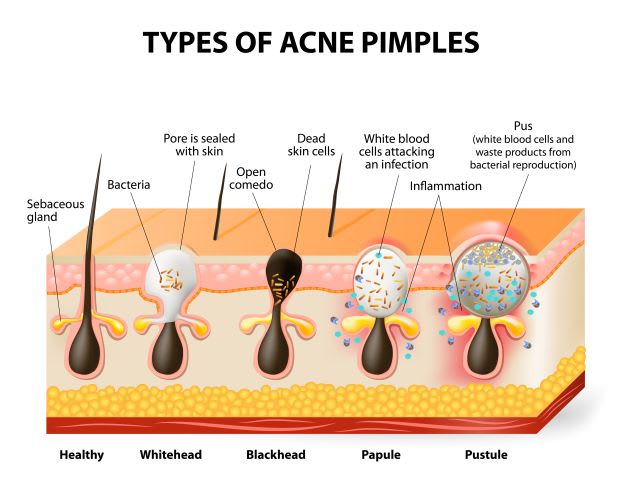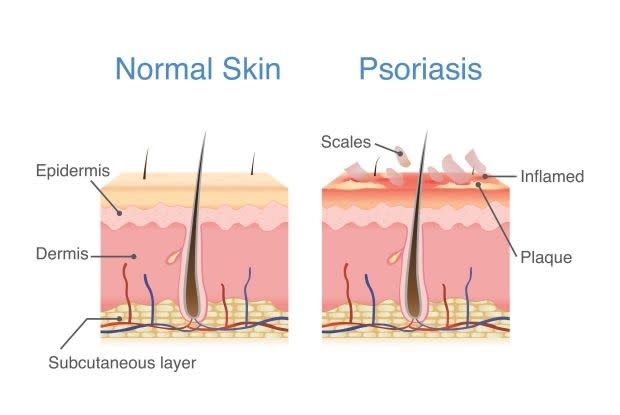Table of Contents
II. Inflammatory Skin Disorders
III. Autoimmune Skin Conditions
Common Skin Disorders
Your skin is the body’s largest organ and protects it from many external allergens and foreign substances. It is responsible for many important functions; skin holds in fluids to prevent dehydration, stabilizes your body temperature, and helps you interact with the outside world through sensations like warmth and pain.
Healthy skin is also essential for keeping bacteria, viruses, and other causes of infection away. When you are exposed to sunlight, your skin helps synthesize vitamin D. The skin does many things for the body, but it can be frustrating if you develop pimples or a rash.
There are hundreds of different skin conditions that can cause inflammation and itchiness. Most skin disorders are due to lifestyle factors, but some are genetic. Many common skin disorders are minor, but others can cause severe symptoms and indicate a more serious, underlying health problem. If you notice any abnormalities on your skin, it can be a good idea to see your doctor for a routine checkup.
Common skin disorders include acne, rosacea, and eczema. Some skin conditions are caused by an autoimmune disorder, including psoriasis and scleroderma. Skin conditions can be successfully treated with topical creams like tretinoin and benzoyl peroxide. You can save money on your skin disorder medications through an online Canadian pharmacy like Canadian Pharmacy Service. Read on to learn more about these skin disorders and how you can treat them. It depends on the cause, but most inflammatory skin conditions are usually treatable. Generally, these skin disorders cause redness, sensitivity, swelling, and mild to severe itching. Skin infections are a common cause of inflammation and can occur when a foreign substance like bacteria enters the skin through an opening. Inflammatory skin conditions typically affect patches of skin but are occasionally known to spread to the entire body. Acne is the most common skin condition in the United States, affecting at least 85 percent of teens and young adults between the ages of 12 and 24. [1] Acne is typically harmless, but it can leave scars behind. Some people experience acne briefly, while others may have recurring or persistent acne. Acne is common in teenagers because puberty can disrupt the hormones and produce more oil that clogs the surface of the skin. Mild acne can be treated with home remedies such as moisturizers and certain tea-tree oils. Research suggests that excess stress can lead to acne, so relaxation techniques may be helpful in managing acne. Moderate to severe acne is typically treated medically using Retin-A Cream (tretinoin) azelaic acid, salicylic acid, or benzoyl peroxide. Rosacea is another common inflammatory skin condition. This skin disorder usually affects the face, causing redness, irritation, and pimples that may be mistaken for acne. Rosacea is not as common as acne, but still affects approximately 20 percent of Americans. [2] Dairy products, spicy foods, caffeine, alcohol, and sun exposure can worsen symptoms of rosacea. Currently, there is no cure for this skin disorder, but skin creams and topical antibiotics can help manage symptoms. Rosacea can sometimes lead to visible blood vessels on the face (telangiectasia). If you wish to reduce the visibility of these blood vessels, dermatologists may use laser treatment to shrink these blood vessels with intense pulses of light. Laser treatment for rosacea is slightly painful and can cause bruising and tenderness. Rosacea also leaves behind thickened skin, which can be removed by a cosmetic surgeon. Eczema is an inflammatory skin disorder where patches of skin become rough, cracked, and itchy. There are several types of eczema, and it may present differently from person to person. Eczema is commonly triggered by environmental factors like smoke, pollen, and certain fragrances. Eczema can also be triggered by nuts or dairy products. Some patients outgrow eczema, but this skin condition can affect you throughout adulthood. [3] Eczema rashes can cover much of the body and typically occur in the elbow or knee creases. Like rosacea, there is no cure for eczema. At home, you can try lukewarm baths, apply moisturizers, and use a humidifier to manage symptoms. Medically, eczema is usually treated with topical corticosteroids. An autoimmune skin disorder occurs when the immune system mistakenly attacks itself. Autoimmune skin disorders can affect a variety of body areas. If you suspect an autoimmune skin problem, you should avoid self-diagnosing and see a dermatologist. . There are many different autoimmune skin disorders, and getting a proper diagnosis is important to get the right treatment. Psoriasis is a common autoimmune skin disorder caused by an overactive immune system that speeds up the growth of skin cells. When skin cells build up, red layers of plaque and silver flakes of dead skin develop. Psoriasis tends to run in families and usually appears in early adulthood. Psoriasis may occur after a skin infection, sun exposure, certain medications, or excess stress. This skin disorder can be treated and managed with corticosteroids, synthetic vitamin D, and retinoids. Scleroderma is another common autoimmune skin disorder. This condition is characterized by thickened and hardened skin. In addition to the skin, scleroderma can affect the bones and muscles. Scleroderma can affect people of any age but is more commonly diagnosed in those between the ages of 30 and 50. [4] Immunosuppressants may be prescribed to calm the immune system and reduce symptoms. Scleroderma patients may also use ultraviolet light therapy to improve the skin’s condition and appearance. You can prevent most skin disorders by eating a healthy diet, exercising for good blood circulation, and routinely cleansing the skin. However, some skin conditions are caused by genetic factors outside your control. Make sure to see your doctor if you notice symptoms of a skin disorder. An early diagnosis goes a long way in slowing the progression of skin diseases, which is especially important for chronic and severe conditions. Your skin does a lot for you, so you owe your skin proper care and maintenance. The content in this article is intended for informational purposes only. This website does not provide medical advice. In all circumstances, you should always seek the advice of your physician and/or other qualified health professionals(s) for drug, medical condition, or treatment advice. The content provided on this website is not a substitute for professional medical advice, diagnosis, or treatment.
Inflammatory Skin Disorders
a. Acne

b. Rosacea
c. Eczema
Autoimmune Skin Conditions
a. Psoriasis

b. Scleroderma
Preventing Skin Disorders
